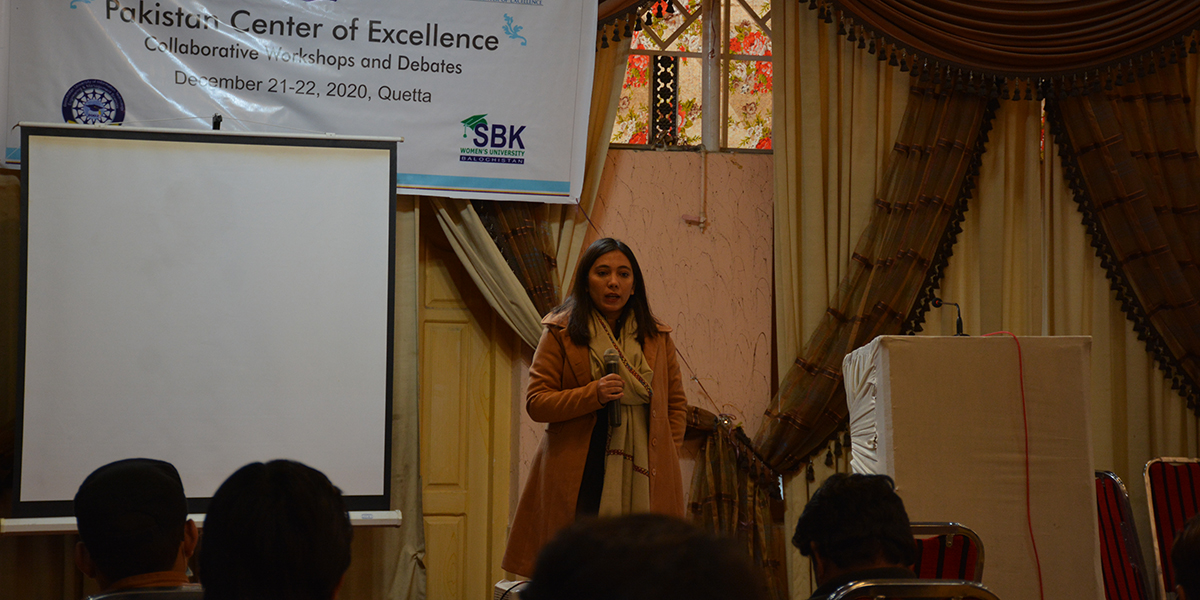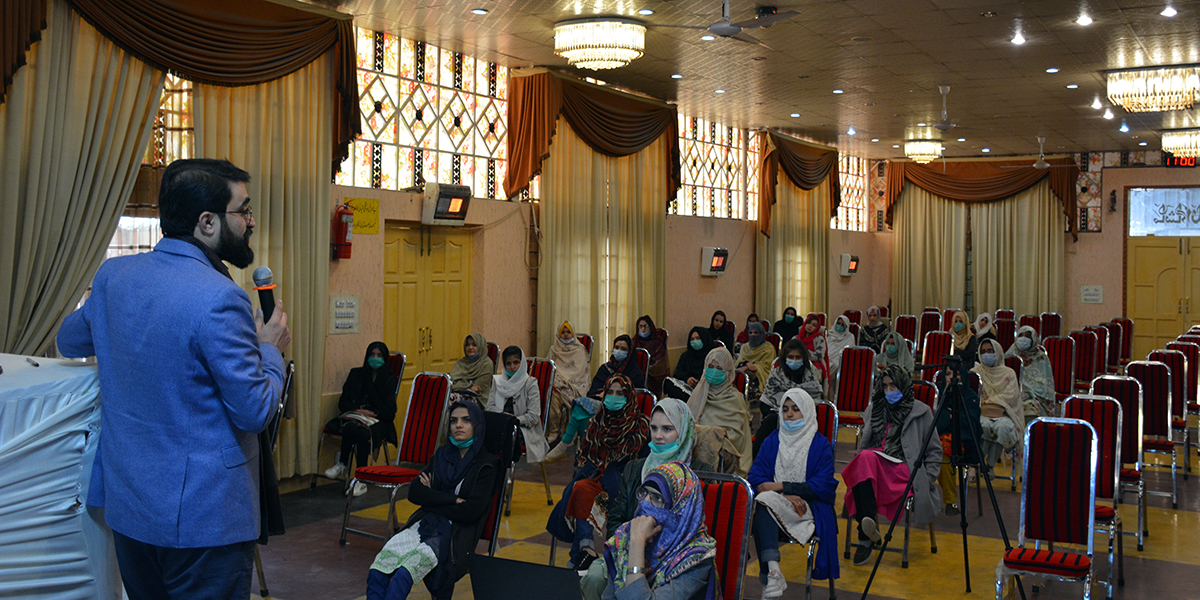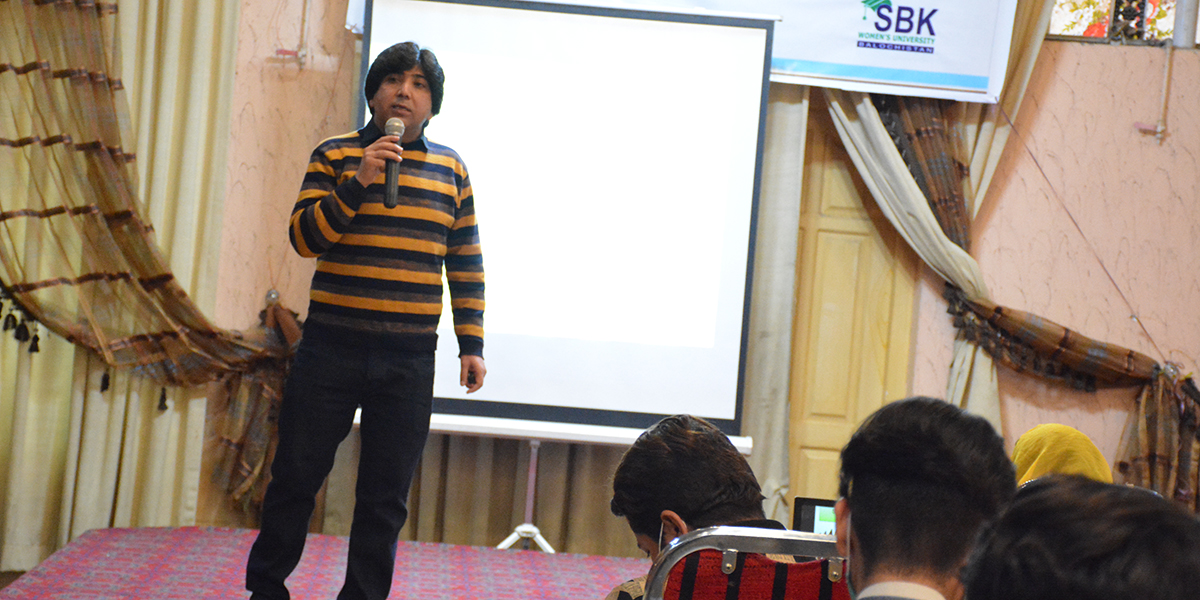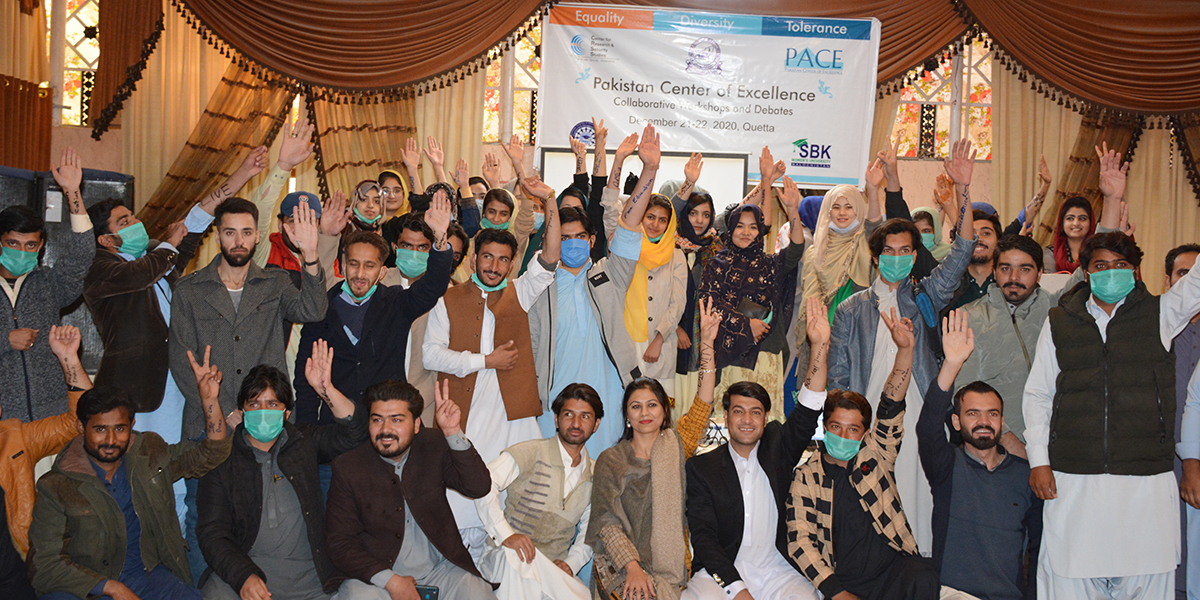The Center for Research and Security Studies (CRSS) conducted the seventeenth round of two-day PACE Collaborative workshops and debates for university students, on December 21 – 22, 2020, in Quetta. The workshop was conducted under the umbrella of the Pakistan Center of Excellence (PACE), a counter-radicalization, pluralistic values focused project, in collaboration with the Dutch Government. Participants included students from University of Balochistan, Balochistan University of IT, Engineering and Management Sciences (BUITEMS), and Sardar Bahadur Khan Women University. `A total of 80 students participated in the workshop of which 48 were female participants and 32 were female participants.
Project Manager, Ms. Farhana Kanwal started off the workshop with an introductory session and welcomed the participants to the workshop. Ms. Kanwal said that PACE is a counter radicalization initiative by CRSS which was started in September, 2015 and completed its first phase in September, 2018. The core objective of PACE is to indoctrinate the habit of questioning and critical thinking among the youth of Pakistan. She added that the purpose of such activities is to bring together the youth at one platform and discuss about critical issues of multiculturalism, diversity, democracy and accountability. Youth is the shaper of future and whole objective of reaching out to them is to prepare a cadre of young people equipped with the tools of critical thinking. We believe that today’s younger generation has the ability to adopt new ideas and question preconceive narrative of intolerance. She stressed on questioning to start the process of positive transition of a society. She also stressed on including all the marginalized groups for a greater cause of peacebuilding and social cohesion. Ms. Farhana elaborated on the success and achievements of PACE in its first phase and also the objectives of PACE Evolution.

The first formal session of the event was kicked off by Mr. Jahangir Bazai who spoke on ‘Leadership and Motivation’. He shared a definition of leadership with the audience that said ‘“Leadership is one of the most observed and least understood phenomena on earth”. He elaborated that everybody amongst us wants to be a leader; however, there are certain qualities that we tend to ignore which are required for being a good leader. Mr. Bazai said that a good leader will always a good followership. Without followership, a leader cannot move his mission forward. He added that it is an art have things done by the people. He also elaborated some points that are required to be a good leader; purpose, planning, decision making, communication skills, organizing meetings and ability to team building. He also differentiated between leadership and management saying that management produces order whereas leadership produces change. He also shared that there are certain things that affect the efficacy of leadership in different environments which can height, gender, intelligence, self-confidence, integrity, extroversion and social background. Mr. Bazai also shared that there are no certain set of traits that differentiate leaders from non-leaders. He then shared a chart by PEW Research Center with the audience which analysed the various traits of leadership that mattered the most. Honesty, intelligence and decisiveness were the top three qualities listed. He explained that for being a leader, skill is equally needed alongside will and good communication skills are a prerequisite for an effective leadership. He shared some important tips about improving leadership;

Selection matters: desire to become a leader and baseline skills are important
Leaders are made not born: even the naturally talented need to learn to be effective
Leaders learn best through experience: the best organisations think carefully about how to provide it
Training works: some development programs are effective, particularly when focused on coaching and mentoring
Accountability is critical: removing ineffective leadership is one of the fastest ways to improve overall performance
Second session of the day was conducted Ms. Hussan Ara who spoke on “Respect for Diversity, Rights and Opinions”. She started with explaining that the concept of diversity encompasses acceptance and respect. It means understanding that each individual is unique, and recognizing our individual difference:
- Cultural differences
- Religious differences
- Racial differences
- Linguistic differences
Ms. Hussan Ara added that world is a global village as the world is becoming increasingly diverse and interconnected, cultural competence is becoming essential with time. Culture is an important dimension of diversity for community. Culture has been challenging to define as a dynamic concept that changes both individuals and societies together overtime. Culture in today’s society refers to more than just cultural and ethnic groups but also includes racial groups, religious groups, sexual minority groups, socio-economic groups, nation-states and corporations etc. She said that gender diversity is also one of the important components which is often ignored or frowned upon because of the patriarchal mind set we are following for the longest time.
Human rights are basic rights that belong to all of us because we are human. They embody key values in our society such as fairness, dignity, equality and respect. They are an important means of protection for us all, especially those who may face abuse, neglect and isolation. Culture can influence the norms and practices of individuals, families, organisations, local communities and the broader society. Respect for rights mean that every citizens of a democratic state is provided with some important rights and it is duty of everybody to respect each other’s rights and comply with them.
We live in a world today where everyone is different .We all have opinions and many people may or may not agree with the opinions that you share. Every opinion can be respected, but cannot be accepted. Opinions can be good to express if the people around you have that same opinions about a touchy subject. We live in a world filled with conflict. Opinions and world views, likes and dislikes are as varied as the number of humans on this planet. Most of us like to think we are tolerant of people who see the world differently than we do. Every human being is valuable, regardless of their opinions or worldwide.

At the end of her session, she explained there are five ways to ensure respect for diversity, righst and opinions. First of all, begin with an open mind; secondly, look for common ground; thirdly, listen closely; fourthly, Keep your emotions in check; and last but not the least, seeking understanding.
Second day of the workshop was opened by Ms. Urooj Rajput who spoke on “Fundamental Human Rights”. She started with defining rights that every human being possesses by virtue of being human and which are recognized and protected by the law. Fundamental Human rights are the basic rights and freedoms that belong to every person in the world, from birth until death. These basic rights are based on shared values like dignity, fairness, equality, respect and independence. She added that nature of human rights in inherent, universal, inalienable, indivisible, fundamental, and essential and necessary. Speaking of the history and origin of human rights, Ms. Rajput shared a list of fundamental human rights every human being possesses which are right to equality, right to freedom, right to freedom from exploitation, right to freedom of religion, and cultural and educational rights.

Ms. Rajput also highlighted religious protection given to right to life and respect for human life by referring to a verse from the Holy Quran; “Whosoever kills a human being without (any reason like) man slaughter, or corruption on earth, it is as though he had killed all mankind (5:32)”. Right to property is protected by; “Do not devour another person’s property wrongfully unless it be trade based on mutual consent (Al – Nisa: 9)”. Religion of freedom is protected; “There is no compulsion in the matter of religion (Baqrah: 256)”.
She also elaborated on civil, political, economic, social and cultural rights. Ms. Urooj explained the rights enshrined in the Universal Declaration of Human Rights (UDHR), and in the Constitution of 1973 of Pakistan.
The last session of the day was conducted by Mr. Javed Sarparah who did an activity based session on “Thinking out of the Box”. He asked multiple analytical questions and presented situations to the students to resolve them. He explained that why critical thinking important is.
Ms. Farhana Kanwal closed the session with highlighting the importance of debates and critical thinking. She said that debate is a way of identifying and discussing the issues with logic and reason. She further said that an ideal society would always look beyond differences and there will be respect of rights and opinions for all with no discrimination. Ms. Kanwal also thanked the participating universities and students for their support and encouragement.

